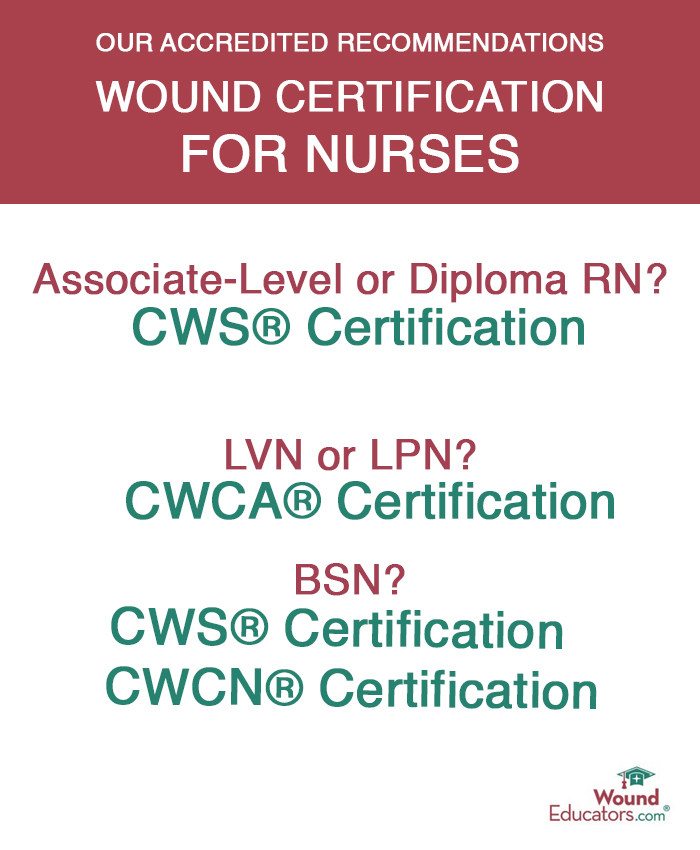Did you know that nurses make up the largest healthcare occupation in the US? Nurses are a critical part of patient success. Arguably, wound care nurses are the most important part of the healthcare industry. The U.S. Bureau of Labor Statistics (BLS) predicted that between 2014 and 2024, employment of LPNs, LVNs, and RNs will grow 16%. The biggest indicator of this job growth is the ever-growing (aging) population.
Create Your Nursing Specialty
One way nurses are setting themselves apart is by proving their commitment to the healthcare field. Obtaining additional certifications, including the wound care certification for nurses, is an excellent way to create distinction.
Creating a specialty, such as wound care management, solidifies advancement of individual nurses worldwide. There are a handful of wound care certifications for nurses available including the Certified Wound Care Associate (CWCA), Wound Care Certification (WCC), Certified Wound Care Nurse Certification (CWCN), and the Certified Wound Specialist (CWS).
Although there are four paths to wound care certification for nurses we will discuss, not every nurse can pursue each.
Wound Care Certification for Nurses – Who Can Get What?
 While the clinical requirements to obtain each wound care certification for nurses varies, one constant is maintaining an active, unrestricted license.
While the clinical requirements to obtain each wound care certification for nurses varies, one constant is maintaining an active, unrestricted license.
CWCA® Certified Wound Care Associate
Associate-degree nurses, RNs, LPNs, LVNs can all obtain the CWCA wound certification, however, there are better wound care certification choices for BSNs and RNs. We encourage RNs to obtain the CWS® Certified Wound Specialist Certification. BSNs can obtain either the CWS® or the CWCN® certification. These wound care certifications for nurses dictate a igher level of education.
CWS® Certified Wound Specialist
Any healthcare professional with a Bachelor’s degree or higher can obtain the CWS® wound certification– including BSN, DO, DPM, DVM, MD, NP, PA, PT, RD, or RNs. New to 2018, Associate RNs and Diploma RNs can now become CWS® wound care certified. Formerly, Associate and Diploma RNs had to choose the CWCA® certification.
CWCN® Certified Wound Care Nurse
To obtain the CWCN® Certified Wound Care Nurse certification, one must have a bachelor’s degree or higher and be currently licensed as an RN. This requires you to have already passed the NCLEX exam and have an active RN license.
WCC® Wound Care Certified
To obtain the WCC® certification, one must be a RN, LPN, LVN, PA, NP, PT, OT, OTA, DO, or DPM with an active, unrestricted license. The WCC® is offered by the NAWCCB. Other eligibility requirements include an educational component and an experience component.
Trust the Wound Care Experts
We surveyed an elite panel of wound care specialists and wound care nurses to share the fundamental knowledge needed to pass national board certification exams. We used this information as the basis for creating each of our wound care certification courses.
Wound Care Courses for Nurses
We have created three distinct wound care certification courses for nurses– because we recognize not all nurses are the same! Our courses address the variances in knowledge and create a relatable path forwound education for each nurse.
LPN / LVN Wound Care Certification Course
Any LPN or LVN that completes our wound care certification course will receive 50 CE hours. Our wound courses cover wound basics, past studies, current products, and an overview of many wound care topics and fundamentals necessary for success in wound management. LPNs and LVNs can become certified via the CWCA® or WCC® exam. We recommend LPNs and LVNs pursue the CWCA® Certified Wound. Care Associate certification since it is an accredited certification. The CWCA® certification lasts for ten years.
RN Wound Care Certification Course
Our wound care certification course for RNs will provide 50 CE credit hours to RNs upon completion. Our RN course allows RNs to work at their own pace with 24/7 access. We recommend associate-level RNs pursue the accredited CWS® Certified Wound Specialist certification. Our wound care certification course for RNs will also prepare nurses for the WCC® certification, but this wound certification only lasts 5 years. The CWS® certification lasts for ten years and is the most prestigious accredited certification option available for diploma and associate level RNs.
BSN / Nurse Practitioner Wound Care Certification Course
Any nurse with a bachelor’s degree in nursing or any nurse practitioner will receive 57 hours for completing the BSN/ NP wound care certification course. This course builds upon existing advanced education and will provide invaluable wound care knowledge to integrate into practice. As we discussed earlier, we recommend BSNs and Nurse Practitioners pursue either the CWCN certification or the CWS® certification. The CWS® Certified Wound Specialist certification provides a stronger differentiation since it is only offered to those with a Bachelor’s degree or higher. The CWS® certification is valid for ten years, the CWCN is valid for 5. These two are the only accredited certification options available for BSNs or NPs.
Other Wound Care Courses Available
One common misconception is that Physician Assistants are nurses. Some nurses may go on to become Physician Assistants, but having a nursing degree or prior title is not required. We offer a separate physician assistant wound care certification course.
WoundEducators.com does offer a separate course for CNAs and MAs. We recommend CNAs and MAs pursue the accredited CWCA certification.
Your Source for Wound Care Nurse Advancement
Consider us the expert on wound care certification for nurses and beyond. We ensure that each one of our courses speaks to the right audience to maximize learning. We take prior education and knowledge into consideration when creating our wound care certification courses and use that existing knowledge to build upon. Training and specialization distinguish one nurse from another- and we would love to help you set yourself apart!
